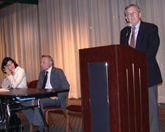As the Loyola community came together to reflect onSept. 11 at a faculty panel discussion, opinions were shared, actions were criticized, predictions were made and paths in which to proceed were suggested.
“A university is supposed to be a site of intellectual freedom and active discussion,” said moderator Eric Gorham, associate professor of political science.
The panelists demonstrated this as they spoke from four very different perspectives each influenced by their own personal and academic backgrounds.
First to speak was Ken Keulman, chairman of religious studies, who believes that the hardest things to live with after Sept. 11 are the global ramifications.
“Part of what makes us uneasy is that we don’t knowwhat to think about what happened to us,” he said.
Keulman also noted that prevention through international cooperation on financial, diplomatic and military levels was key to preventing another disaster. He specifically suggested that the U.S. work within the United Nations to form a policy concerning Iraq.
“A [unilateral] attack on Iraq could prompt Hussein to use biological weapons because he would have nothing to lose, and he has no respect for the lives of his people,” Keulman said. Though Keulman looked at the events of Sept. 11 from an American perspective, Sarah Gualtieri, assistant professor of history, focused more on how the action of America affected the rest of the world.
Gualtieri attributed her unique perspective to the fact that she was raised in Canada and has lived and traveled extensively in the Middle East.
While recognizing that attacks of Sept. 11 were “an atrocious act against innocent people,” she compared the new type of racism that has developed in America to earlier precedents such as Jim Crow laws or Anti-Semitism.
“We should not minimize the hate crimes that followed [Sept. 11] or the over 1,000 Middle Easterners who are still incarcerated without due process,” Gualtieri said.
Gualtieri also noted how the typical American is only interested in the Middle East during a crisis.
“Americans would do well to realize how the actions of their government affect the lives of people in the Middle East,” she said.
Looking at yet another aspect of Sept. 11, Larry Lorenz, professor of communications, spoke about the media’s involvement in reporting the facts of the terrorist attacks.
Lorenz praised the media for their coverage in the days immediately following the attack.
“Newspapers served us well…by giving us background, depth, and understanding,” he said.
He cited the Hart-Rudman report issued by a congressional committee from 1999 to 2001 that predicted an attack on American soil because of the growing hatred around the world towards America. The report, which went so far as to recommend a Homeland Security Administration, went largely ignored by the media. CNN, the Los Angeles Times and the Washington Post only briefly covered it.
“The media has an impatience for policy stories,” Lorenz added. “They are not interesting to the people at large, or so the media thinks.”
Lorenz also criticized the media for missing the larger significance of events that have occurred in the wake of Sept. 11 in exchange for “flag waving.”
He warned of heading into an era of McCarthyism and echoed the earlier sentiments of Gualtieri concerning the people being held without their constitutional rights.
“If we really want to honor the victims, we can’t just hold flags, hold panels,” Lorenz said. “We need to inform ourselves, form opinions and make them known to our policymakers.”
Joseph Ganitsky, Bank One Distinguished Professor of International Business, has formed an opinion on why the terrorist attacks happened and how to prevent them in the future.
“By accepting the status quo rather than helping poorer nations… we have allowed this to happen,” he said.
In order to correct this problem, Ganitsky said that we needed to narrow the gap between high and low-income nations in the global economy.
Ganitsky said he believes that this will stop our enemies and hurt their economies.
During the question and answer session that followed one audience member asked if it was a detrimental move on the part of President Bush to label Iran as part of the axis of evil.
Gualtieri responded that she did think that this would be damaging to U.S. Iran relations especially since the recent reformist movement in the younger generations.
The remaining questions turned to the current Israeli-Palestinian conflict with Ganitsky and Gualtieri opposing each other’s viewpoints on terrorism in the region.
Gualtieri’s opinions were attacked by a woman in the audience who also questioned her teaching style. While Gualtieri was unable to respond to the woman’s accusations during the session due to time constraints, she did respond afterwards by saying that in her classes she assigns readings by both Palestinian and Israeli authors. Gualtieri added that many of her students were surprised to learn how similar some of the positions are.
When asked about the change of tone of the discussion from one concerning the issues to one of a more personal nature, Gorham referred to acomment he had made earlier.
“Freedom can involve conflict. Hopefully its reasonable discussion and that is what looks like is going on here.”
Students differed in opinions about the events Loyola planned for the anniversary of Sept. 11.”Something during the day could have been done,” said Laura Revelo, communications sophomore.
Other students, such as communications and history sophomore Mary Anders, disagreed.”Loyola did a great job in offering the students many different ways to commemorate the day and remember those who lost their loves a year ago today.”

Sarah Gualtieri, assistant professor of history, speaks at the panel discussion on Sept. 11. Gualtieri has studied much of and traveled widely in the Middle East. (Charles Costello )






